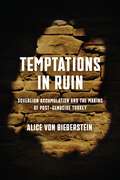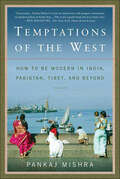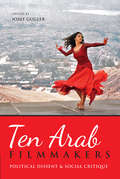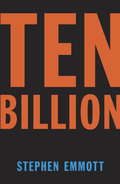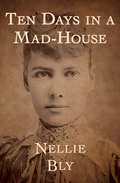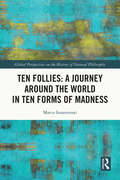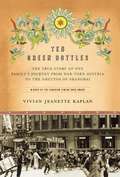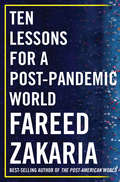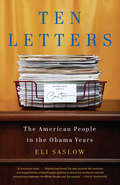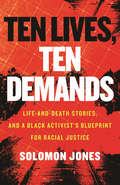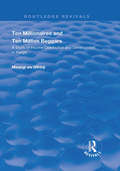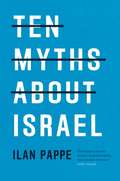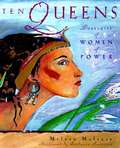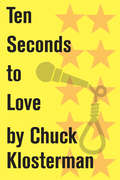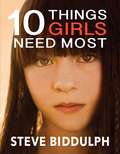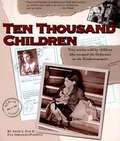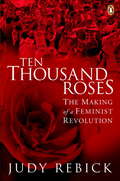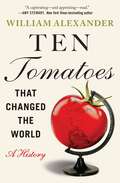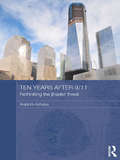- Table View
- List View
Temporary and Child Marriages in Iran and Afghanistan: Historical Perspectives and Contemporary Issues
by S. Behnaz HosseiniThis book discusses the popularity of temporary and child marriages in Iran and Afghanistan and explores their historical background and the reasons why they still persist today. Further, it offers readers insights into the emotional and psychological violence that the women who have been subjected to these practices experience. The respective contributions address the persistence of these traditions, their ramifications for the wellbeing of women and the development of societies and human relations. Taken together, they offer an excellent academic tool for students, academics and researchers studying the anthropology and sociology of kinship, and family in the Middle East.
Temptations in Ruin: Sovereign Accumulation and the Making of Post-Genocide Turkey (The Ethnography of Political Violence)
by Alice von BiebersteinAn ethnographic account of the political-economic afterlife of the Armenian genocide in present-day TurkeyTemptations in Ruin examines the political-economic afterlife of the Armenian genocide in present-day Turkey, focusing on the region of Muş (Moush). Anthropologist Alice von Bieberstein explores how the 1915 genocide and dispossession of Armenians shaped property regimes, citizenship, and economic logics that continue to reverberate today.By combining ethnography with historical context and diverse perspectives, Temptations in Ruin generates new insights into how past violence shapes contemporary economic practices and social relations. To tell this history, von Bieberstein introduces the concept of “sovereign accumulation” to describe the ways in which the state and other actors mobilize histories of sovereign violence for present-day economic benefit. This framework illuminates the legacy of violence and resource extraction present in such practices as urban renewal projects, treasure hunting for “Armenian gold,” and heritage tourism and identifies these practices’ very existence as manifestations of the economic aftermath of the genocide.Temptations in Ruin uncovers the ways in which the genocide gave rise to a racialized property regime and a recursive movement of sovereign accumulation that builds on and re-animates the Armenian genocide as generative of wealth in the present. And it demonstrates the complex interplay between genocide denial, destruction, and valorization in post-genocide contexts. Highlighting the enduring resonance of genocide, von Bieberstein enhances our understanding of political violence’s long-term impacts on society and on the economy.
Temptations of the West: How to Be Modern in India, Pakistan, Tibet, and Beyond
by Pankaj MishraA vivid, often surprising account of South Asia today by the author of An End to SufferingIn his new book, Pankaj Mishra brings literary authority and political insight to bear on travels that are at once epic and personal. Traveling in the changing cultures of South Asia, Mishra sees the pressures—the temptations—of Western-style modernity and prosperity, and teases out the paradoxes of globalization. Avisit to Allahabad, birthplace of Jawaharlal Nehru, occasions a brief history of the tumultuous post-independence politics Nehru set in motion. In Kashmir, just after the brutal killing of thirtyfive Sikhs, Mishra sees Muslim guerrillas playing with Sikh village children while the media ponder a (largely irrelevant) visit by President Clinton. And in Tibet Mishra exquisitely parses the situation whereby the Chinese government—officially atheist and strongly opposed to a free Tibet—has discovered that Tibetan Buddhism can "be packaged and sold to tourists."Temptations of the West is a book concerned with history still in the making—essential reading about a conflicted and rapidly changing region.
Tempted Women: The Passions, Perils, and Agonies of Female Infidelity
by Carol BotwinOver the past ten years, the number of wives who have affairs has grown dramatically—recent surveys suggest by as much as 50 percent. Yet in all the acres of space devoted to male infidelity, so far this has been a largely untouched subject. In this guide, Carol Botwin—advice columnist, therapist, and author—rushes to help rather than condemn. Drawing from six hundred interviews and case histories—with both husbands and wives—Botwin examines causes, initial attractions, affairs in progress, endings, and aftermaths. Throughout, she offers her experienced advice and solutions on how to deal with a lover, children, and husband after the affair has dealt a devastating blow to the marriage. Other books by the author include Men Who Can&’t be Faithful and Is There Sex After Marriage?
Ten Arab Filmmakers
by Josef GuglerTen Arab Filmmakers provides an up-to-date overview of the best of Arab cinema, offering studies of leading directors and in-depth analyses of their most important films. The filmmakers profiled here represent principal national cinemas of the Arab world -- Algeria, Egypt, Lebanon, Morocco, Palestine, and Syria. Although they have produced many of the region's most-renowned films and gained recognition at major international festivals, with few exceptions these filmmakers have received little critical attention. All ten share a concern with giving image and voice to people struggling against authoritarian regimes, patriarchal traditions, or religious fundamentalism--theirs is a cinéma engagé.The featured directors are Daoud Abd El-Sayed, Merzak Allouache, Nabil Ayouch, Youssef Chahine, Mohamed Chouikh, Michel Khleifi, Nabil Maleh, Yousry Nasrallah, Jocelyne Saab, and Elia Suleiman.
Ten Arguments for Deleting Your Social Media Accounts Right Now
by Jaron LanierA timely call-to-arms from a Silicon Valley pioneer. <p><p>You might have trouble imagining life without your social media accounts, but virtual reality pioneer Jaron Lanier insists that we’re better off without them. In Ten Arguments for Deleting Your Social Media Accounts Right Now, Lanier, who participates in no social media, offers powerful and personal reasons for all of us to leave these dangerous online platforms. <p>Lanier’s reasons for freeing ourselves from social media’s poisonous grip include its tendency to bring out the worst in us, to make politics terrifying, to trick us with illusions of popularity and success, to twist our relationship with the truth, to disconnect us from other people even as we are more “connected” than ever, to rob us of our free will with relentless targeted ads. <p> How can we remain autonomous in a world where we are under continual surveillance and are constantly being prodded by algorithms run by some of the richest corporations in history that have no way of making money other than being paid to manipulate our behavior? How could the benefits of social media possibly outweigh the catastrophic losses to our personal dignity, happiness, and freedom? <p>Lanier remains a tech optimist, so while demonstrating the evil that rules social media business models today, he also envisions a humanistic setting for social networking that can direct us toward a richer and fuller way of living and connecting with our world.
Ten Billion
by Stephen EmmottA VINTAGE ORIGINALJust over two hundred years ago, there were one billion humans on Earth.There are now over seven billion of us.And, sometime this century, the world population will reach at least ten billion.Deforestation. Desertification. Species extinction. Global warming. Growing threats to food and water. The driving issues of our times are the result of one huge problem: Us. As the population continues to grow, our problems will increase. And this means that every way we look at it, a planet of ten billion people is likely to be a nightmare. Stephen Emmott, a scientist whose lab is at the forefront of research into complex natural systems, sounds the alarm. TEN BILLION is a snapshot of our planet, and our species, approaching a crisis, and a stark analysis of where this leaves us. TEN BILLION is not another climate book. TEN BILLION is a book about us.From the Trade Paperback edition.thing but a "green" book. And it's not another book about the climate. TEN BILLION is a book about us.From the Trade Paperback edition.
Ten Days in a Mad-House: Large Print
by Nellie BlySoon to be a major motion picture: A courageous female journalist's classic exposé of the horrific treatment of the mentally ill in nineteenth-century America In 1887, Nellie Bly accepted an assignment from publisher Joseph Pulitzer of the New York World and went undercover at the lunatic asylum on Blackwell Island, America's first municipal mental hospital. Calling herself "Nellie Brown," she was able to convince policemen, a judge, and a series of doctors of her madness with a few well-practiced facial expressions of derangement. At the institution, Bly discovered the stuff of nightmares. Mentally ill patients were fed rotten, inedible food; violently abused by a brutal, uncaring staff; and misdiagnosed, mistreated, or generally ignored by the doctors and so-called mental health experts entrusted with their care. To her horror, Bly encountered sane patients who had been committed on the barest of pretenses and came to the shocking realization that, while the Blackwell Island asylum was remarkably easy to get into, it was nearly impossible to leave. This ebook has been professionally proofread to ensure accuracy and readability on all devices.
Ten Days that Changed the Nation
by Stephen PollardSometimes it is not big events or great men or women that change history. Often, an apparently trivial occasion or insignificant decision changes everything. Stephen Pollard's alternative history of the past sixty years examines ten such crucial days in our history. None of them are obviously historic. But each of them changed the country - some for good, others for ill. Combining history, analysis, humour and polemic, this incisive look at events stretched across six decades reveals how and why we became the nation we now are. The ten days which constitute Pollard's history of Britain deal with important areas of national life. The arrival on 22 June 1948 of 492 West Indians aboard HMS Empire Windrush changed the very make-up of the country. The invention of the microwave on 8 October 1945 altered not just what we eat but how we eat - and drink. The education system, Pollard argues, was destroyed by the forced introduction of comprehensive schooling on 12 July 1965. Publication of Germaine Greer's The Female Eunuch on 24 October 1970 changed family life. And the staging of It's a Royal Knockout on 15 June 1987 marked the end of the monarchy as a serious institution. The events of other days transformed culture, politics, crime, sport and the very future of Western civilization. Behind each of the ten days is a story; some of these stories are well known, some obscure. Fusing narrative with analysis, and history with contemporary relevance, Ten Days That Changed the Nation shows us the major impact that apparently minor events can have on our lives. Stephen Pollard's approachable, readable narrative is as engaging as it is controversial. Sure to incite debate, Ten Days That Changed the Nation is a handbook for our times.
Ten Follies: A Journey Around the World in Ten Forms of Madness (Global Perspectives on the History of Natural Philosophy)
by Marco InnamoratiTen Follies: A Journey Around the World in Ten Forms of Madness focuses on a critical question in the history of psychiatry: to what extent does psychopathology describe phenomena that exist before or beyond their description? Marco Innamorati probes the view that any description of a psychopathological phenomenon is, to a significant extent, the result of a construction by the subject describing it or a co-construction made by the clinician and the patient—a perspective also known as the “constructivist” approach.Starting from the work of the philosopher and historian of science Ian Hacking, who proposed the concept of “transient mental illness”, i.e., an “illness that appears at a given time, in a given place, and then disappears” (Hacking, 1998), Innamorati explores some forms of madness that seem to arise in a particular environment and in specific historical circumstances, developing through a kind of epidemic and then disappearing almost definitively. The author evaluates strengths and weaknesses of the “constructivist” approach, by juxtaposing evolving hermeneutical questions to cultural factors. From hysteria to demonic possession, from the “mad travellers” to arctic shamanism, until the recent mushrooming of the hikikomori phenomenon,Ten Follies is an unconventional “journey around the world in ten forms of madness” which takes the reader through astonishing stories of suffering and healing. Against the trend of mapping a single globalised discourse of “folly”, this book embraces a kind of philosophical perspectivism (“ten follies”) which echoes the contemporary cultural transformation of the many narratives of “madness”.
Ten Green Bottles: The True Story of One Family's Journey From War-Torn Austria to the Ghettos of Shanghai
by Vivian Jeanette KaplanTo Nini Karpel, growing up in Vienna during the 1920s was a romantic confection. Whether schussing down ski slopes or speaking of politics in coffee houses, she cherished the city of her birth. But in the 1930s an undercurrent of conflict and hate began to seize the former imperial capital. This struggle came to a head when Hitler took possession of neighboring Germany. Anti-Semitism, which Nini and her idealistic friends believed was impossible in the socially advanced world of Vienna, became widespread and virulent. The Karpel's Jewish identity suddenly made them foreigners in their own homeland. Tormented, disenfranchised, and with a broken heart, Nini and her family sought refuge in a land seven thousand miles across the world. Shanghai, China, one of the few countries accepting Jewish immigrants, became their new home and refuge. Stepping off the boat, the Karpel family found themselves in a land they could never have imagined. Shanghai presented an incongruent world of immense wealth and privilege for some and poverty for the masses, with opium dens and decadent clubs as well as rampant disease and a raging war between nations. Ten Green Bottles is the story of Nini Karpel's struggles as she told it to her daughter Vivian so many years ago. This true story depicts the fierce perseverance of one family, victims of the forces of evil, who overcame suffering of biblical proportion to survive. It was a time when ordinary people became heroes.
Ten Hills Farm: The Forgotten History of Slavery in the North
by C. S. ManegoldTen Hills Farm tells the powerful saga of five generations of slave owners in colonial New England. Settled in 1630 by John Winthrop--who would later become governor of the Massachusetts Bay Colony--Ten Hills Farm was a six-hundred-acre estate just north of Boston. Winthrop, famous for envisioning his 'city on the hill' and lauded as a paragon of justice, owned slaves on that ground and passed the first law in North America condoning slavery. In this mesmerizing narrative, C. S. Manegold exposes how the fates of the land and the families that lived on it were bound to America's most tragic and tainted legacy. Challenging received ideas about America and the Atlantic world, Ten Hills Farm digs deep to bring the story of slavery in the North full circle--from concealment to recovery. Manegold follows the compelling tale from the early seventeenth to the early twenty-first century, from New England, through the South, to the sprawling slave plantations of the Caribbean. John Winthrop, famous for envisioning his "city on the hill" and lauded as a paragon of justice, owned slaves on that ground and passed the first law in North America condoning slavery. Each successive owner of Ten Hills Farm--from John Usher, who was born into money, to Isaac Royall, who began as a humble carpenter's son and made his fortune in Antigua--would depend upon slavery's profits until the 1780s, when Massachusetts abolished the practice. In time, the land became a city, its questionable past discreetly buried, until now. Challenging received ideas about America and the Atlantic world, Ten Hills Farm digs deep to bring the story of slavery in the North full circle--from concealment to recovery.
Ten Hills Farm: The Forgotten History of Slavery in the North
by C. S. ManegoldThe untold story of how colonial New England was built on the Atlantic slave tradeTen Hills Farm tells the powerful saga of five generations of slave owners in colonial New England. Settled in 1630 by John Winthrop, governor of the Massachusetts Bay Colony, Ten Hills Farm, a six-hundred-acre estate just north of Boston, passed from the Winthrops to the Ushers, to the Royalls—all prominent dynasties tied to the Native American and Atlantic slave trades. In this mesmerizing narrative, C. S. Manegold exposes how the fortunes of these families—and the fate of Ten Hills Farm—were bound to America’s most tragic and tainted legacy.Manegold follows the compelling tale from the early seventeenth to the early twenty-first century, from New England, through the South, to the sprawling slave plantations of the Caribbean. John Winthrop, famous for envisioning his "city on the hill" and lauded as a paragon of justice, owned slaves on that ground and passed the first law in North America condoning slavery. Each successive owner of Ten Hills Farm—from John Usher, who was born into money, to Isaac Royall, who began as a humble carpenter’s son and made his fortune in Antigua—would depend upon slavery’s profits until the 1780s, when Massachusetts abolished the practice. In time, the land became a city, its questionable past discreetly buried, until now.Challenging received ideas about America and the Atlantic world, Ten Hills Farm digs deep to bring the story of slavery in the North full circle—from concealment to recovery.
Ten Lessons for a Post-Pandemic World
by Fareed ZakariaCOVID-19 is speeding up history, but how? What is the shape of the world to come? <P><P> Lenin once said, "There are decades when nothing happens and weeks when decades happen." This is one of those times when history has sped up. CNN host and best-selling author Fareed Zakaria helps readers to understand the nature of a post-pandemic world: the political, social, technological, and economic consequences that may take years to unfold. Written in the form of ten "lessons," covering topics from natural and biological risks to the rise of "digital life" to an emerging bipolar world order, Zakaria helps readers to begin thinking beyond the immediate effects of COVID-19. Ten Lessons for a Post-Pandemic World speaks to past, present, and future, and, while urgent and timely, is sure to become an enduring reflection on life in the early twenty-first century. <P><P><b>A New York Times Bestseller</b>
Ten Letters: The Stories Americans Tell Their President
by Eli SaslowEvery day, President Obama reads ten representative letters among the thousands he receives from citizens across the land. The letters come from people of all ages, walks of life, and political points of view. Some are heartbreaking, some angry, some hopeful. Indeed, Obama reads as many letters addressed "Dear Jackass" as "Dear Mr. President." Eli Saslow, a young and rising star at the Washington Post, became fascinated by the power of these letters and set out to find the stories behind them. Through the lens of ten letters to which Obama responded personally, this exceptionally relevant and poignant book explores those individual stories, taking an in-depth look at the misfortunes, needs, opinions, and, yes, anger over the current state of the country that inspired ten people to put pen to paper. Surprisingly, what also emerges from these affecting personal narratives is a story about the astounding endurance and optimism of the American people. Ten Letters is an inspiring and important book about ordinary people and the issues they face every day--the very issues that are shaping America's future. This is not an insider Washington book by any means, but a book for the times that tells the real American stories of today.From the Hardcover edition.
Ten Lives, Ten Demands: Life-and-Death Stories, and a Black Activist's Blueprint for Racial Justice
by Solomon JonesTold through the powerful stories of Black lives that were ravaged by racism, this manifesto holds 10 demands to rectify racial injusticeTold through his perspective as an activist, acclaimed commentator Solomon Jones tells the stories of real people whose lives and deaths pushed the Black Lives Matter movement forward. He explains how each act of violence was incited by specific instances of structural racism, and details concrete and actionable strategies to address crimes committed by our &“justice&” system. These stories and strategies are a critical resource for social justice activists looking to further their anti-racist education. These 10 demands form an actionable plan that is necessary to repair our racist past, change the racist present, and bring justice to the future: 1. George Floyd: Pay financial reparations to Black communities that have been damaged by legalized racism. 2. Michael Brown: Use consent decrees to reform police departments that demonstrate a &“pattern or practice&” of racism and police brutality. 3. Hassan Bennett: Offer compensation for all those who are wrongfully imprisoned. 4. Breonna Taylor: Require functioning body cameras and ban no-knock warrants. 5. Eric Garner: All police disciplinary and dismissal records must be made public. 6. Alton Sterling: Change federal law to allow prosecution of flagrant lawbreakers within police departments. 7. Tamir Rice: Use independent prosecutors to eliminate prosecutorial conflicts of interest. 8. Trayvon Martin: Eliminate stand-your-ground laws. 9. Deborah Danner: Defund the police and move funds to trained social workers, mental health professionals, and conflict resolution specialists. 10. Sandra Bland: End racial profiling.
Ten Millionaires and Ten Million Beggars: A Study of Income Distribution and Development in Kenya (Routledge Revivals)
by Mwangi Wa. GithinjiThis title was first published in 2000. An analysis of income distribution and development in Kenya, seeking to increase the reader's understanding of the political economy of that country. The author offers three contributions. He provides an estimate of income inequality in Kenya. He presents data on time allocation in Kenya which makes it possible to compare the distribution of work with the distribution of income. Finally, he attempts to construct a class analysis that goes beyond the debates of the 1970s and 1980s, and goes on to draw a number of important conclusions from his findings.
Ten Myths About Israel
by Ilan PappeThe myths and reality behind the state of Israel and the Israeli-Palestinian conflict—from &“the most eloquent writer on Palestinian history&” (New Statesman)The outspoken and radical Israeli historian Ilan Pappe examines the most contested ideas concerning the origins and identity of the contemporary state of Israel. The &“ten myths&”—repeated endlessly in the media, enforced by the military, and accepted without question by the world&’s governments—reinforce the regional status quo and include: • Palestine was an empty land at the time of the Balfour Declaration. • The Jews were a people without a land. • There is no difference between Zionism and Judaism. • Zionism is not a colonial project of occupation. • The Palestinians left their Homeland voluntarily in 1948. • The June 1967 War was a war of &‘No Choice&’. • Israel is the only Democracy in the Middle East. • The Oslo Mythologies • The Gaza Mythologies • The Two-State Solution For students, activists, and anyone interested in better understanding the news, Ten Myths About Israel is another groundbreaking study of the Israel-Palestine conflict from the author of The Ethnic Cleansing of Palestine.
Ten Queens
by Milton MeltzerPowerful female rulers interpreted in striking words. From the courage and beauty of Esther to the reforming spirit of Catherine the Great, here are essays about ten queens by an author who has been called, "arguably the best writer of social history for children and adolescents ever." Meltzer, by his own description, is accustomed to presenting history "from the bottom up," but he takes a "top down" approach for these monarchs, revealing the personal and political natures of women who commanded power not because "they happened to marry a king" but because they "ruled in their own right, by themselves. Or if they sat on thrones beside kings, they had as much or more to say about governing than their husbands." Most were, by today's standards, astonishingly young. Many were physically powerful, accomplished women. Some were schooled to rule, others not. But all were ambitious, passionate, and determined to hold power. All were subject to suspicion and envy. And all, in their successes and failures, ideals and compromises, assumptions and privileges, present interesting contrasts with the lives of women today.
Ten Seconds to Love
by Chuck KlostermanOriginally collected in Sex, Drugs, and Cocoa Puffs and now available both as a stand-alone essay and in the ebook collection Chuck Klosterman on Media and Culture, this essay is about Marilyn Monroe and Pam Anderson.
Ten Things Girls Need Most: A Raising Girls Interactive Book
by Steve Biddulph10 Things Girls Need Most is a dual gift. It provides the very best information we have about girls growing up today, alongside interactive tasks and self-exploration practices that will help you put this knowledge into practice. These interactive tasks are simple questions to get you thinking about your own life, your family and, of course, your daughter. This book grew out of years of online discussions with parents increasingly concerned about the health issues their daughters were facing, such as: • feeling inadequate • suffering long periods of deep unhappiness • embarrassment about their developing bodies and appearance • friendship struggles • feeling alone in their struggles • insecurity about their sexuality. This is a whole new book on the life of girls and a reflection of the issues that parents want to explore in more depth. This information will help your daughter develop the necessary emotional strength and mental skills to keep her healthy throughout her entire life.
Ten Thousand Children: True Stories Told By Children Who Escaped The Holocaust On The Kindertransport
by Anne Fox Eva Abraham-PodietzSome copies accompanied by Teaching guide for Ten thousand children. Tells the true stories of children who escaped Nazi Germany on the Kindertransport, a rescue mission led by concerned British to save Jewish children from the Holocaust.
Ten Thousand Roses
by Judy RebickTen Thousand Roses is a rich tapestry of stories told by over a hundred feminists from across Canada who organized, discussed, protested and struggled for change. Legalized abortion, resistance to male violence, pay equity and employment equity, legal equality through the Charter, pornography, anti-racism, action against poverty, rights for Aboriginal women and child care: these are the issues that rallied Canadian women to activism from the 1960s through the 1990s, the second wave of feminism. Judy Rebick, feminist activist, weaves together an insightful and stirring oral history full of four decades of struggle, defeat and triumph. The book also offers honest and insightful discussions of the differences that simultaneously divided and strengthened the women's movement in its efforts to remake a male-dominated culture. These stories define the Canadian women's movement as one of the most successful on the planet and open a treasure chest of knowledge for anyone wanting to make a better world.
Ten Tomatoes that Changed the World
by William AlexanderNew York Times bestselling author William Alexander takes readers on a surprisingly twisty journey through the history of the beloved tomato in this fascinating and erudite microhistory. The tomato gets no respect. Never has. Stored in the dustbin of history for centuries, accused of being vile and poisonous, appropriated as wartime propaganda, subjected to being picked hard-green and gassed, even used as a projectile, the poor tomato is the Rodney Dangerfield of foods. Yet, the tomato is the most popular vegetable in America (and, in fact, the world). It holds a place in America's soul like no other vegetable, and few other foods. Each summer, tomato festivals crop up across the country; John Denver had a hit single titled "homegrown Tomatoes;" and the Heinz tomato ketchup bottle, instantly recognizable, is in the Smithsonian. Author William Alexander is on a mission to get tomatoes the respect they deserve. Supported by meticulous research but told in a lively, accessible voice, Ten Tomatoes that Changed the World will seamlessly weave travel, history, humor, and a little adventure (and misadventure) to follow the tomato's trail through history. A fascinating story complete with heroes, con artists, conquistadors and, no surprise, the Mafia, this book is a mouth-watering, informative, and entertaining guide to the good that has captured our hearts for generations.
Ten Years After 9/11 - Rethinking the Jihadist Threat: Rethinking The Jihadist Threat (Routledge Security in Asia Pacific Series)
by Arabinda AcharyaTen years after the 9/11 attacks this book reassesses the effectiveness of the "War on Terror", considers how al-Qaeda and other jihadist movements are faring, explores the impact of wider developments in the Islamic world such as the Arab Spring, and discusses whether all this suggests that a new approach to containing international, especially jihadist, terrorism is needed. Among the book’s many richly argued conclusions are that the "War on Terror" and the invasions of Afghanistan and Iraq have brutalised the United States; that the jihadist threat is not one, but rather a wide range of separate, unconnected struggles; and that al-Qaeda’s ideology contains the seeds of its own destruction, in that although many Muslims are content to see the United States worsted, they do not approve of al-Qaeda’s violence and are not taken in by the jihadists’ empty promises of utopia.

